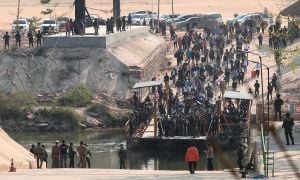Ukraine remains firm on its conditions for peace negotiations with Russia, driven by the continuing conflict and differing approaches from both sides. Ukrainian President Volodymyr Zelensky recently expressed the necessity for Ukraine and European nations to engage directly with Russia and the United States at the negotiating table. He asserted, "Ukraine, Europe together with America we must be at the negotiating table together with the RF... to prevent promises of normalization from overshadowing the pressing need for peace." This statement marks another step toward securing greater agency for Ukraine and its European partners as they seek to bring lasting resolution to the conflict.
Zelensky's emphasis on cooperative negotiation underlines his criticism of what he perceives as insufficient U.S. mediation. He believes the security of Europe and Ukraine cannot be effectively upheld without comprehensive participation. His comments come at a time when conditions for peace negotiations are increasingly complicated due to Russia's public stance and military engagements.
Contrasting with Zelensky's call to action, Russian Foreign Minister Sergey Lavrov reiterated during recent discussions with Turkish officials, including his counterpart, Hakan Fidan, Russia's steadfast condition for halting its military operations. "Russia is ready for negotiations, but will terminate hostilities when agreements are reached… and not by just halting on the frontline without substantive agreements," Lavrov stated. This statement encapsulates Russia's expectations, highlighting their reluctance to agree to temporary ceasefires.
Lavrov’s remarks reflect Russia’s increasingly urgent demands for what they deem as substantial results before stopping offensive operations. He has explicitly rejected any proposal for temporary peace arrangements, framing them as inadequate for meaningful dialogue. Russian officials maintain their insistence on achieving not just immediate pauses but comprehensive and long-lasting resolutions.
The geopolitical chess game is undoubtedly complicated. Caught between statements from different parties, observers note the risks of misunderstandings and misalignments. Zelensky's administration signals intent to hold elections contingent on the lifting of martial law, yet he recognizes the instability this presents amid the active conflict.
Meanwhile, Lavrov outlined the potential for stoking future conflicts if peace is pursued hastily without addressing what he terms "deep resolutions." This echoes previous discussions where the complexity of negotiations has often left both parties at loggerheads.
Zelensky has also stressed the issue of frozen Russian assets abroad, remarking these should be redirected to benefit Ukraine directly, framing them as funds for recovery rather than rewards for aggressors.
To date, continuous military actions and posturing complicate the diplomatic route. Both Zelensky’s and Lavrov’s words serve as reminders of the current volatility of peace talks. The framework for negotiations marks Ukraine's desire for fairness, depicting their aim as more than just tactical gain but also as restoration of proper relations with its European neighbors and the U.S.
With broader concerns over stability and humanitarian disasters looming over Ukraine, the international community watches closely. Any ceasefire could mean not only the end of hostilities but could also spark avenues for reconstruction and restoring peace. Yet, the prelude to negotiations remains complex, and the path to peace seems riddled with challenges.
A key takeaway from recent statements is the pressing need for clarity and unity among the allies supporting Ukraine. The U.S. continues to advocate for Ukraine’s rightful place at the negotiation table, reinforcing its support for both diplomatic and military efforts.
Indeed, as both sides prepare for potentially tense discussions, questions linger over whether fruitful dialogue can emerge from the ashes of conflict. The stakes are incredibly high, with millions waiting for resolution amid prolonged uncertainty.
Will the calls for inclusive negotiations resonate widely, or will the entrenched positions of both sides limit avenues for dialogue and peace? Only time will tell as humanitarian and geopolitical factors continue to weigh heavily on the situation.



